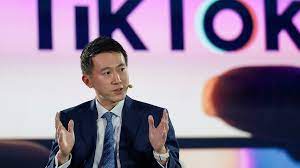Tiktoks CEO Shou Zi Chew made his first appearance before Congress on Thursday as the Biden administration’s threats against TikTok escalates. considering recent actions by the White House, lawmakers, and federal law enforcement agencies, TikTok CEO Shou Zi Chew faces a potentially harsh turn in the spotlight of the government.
The hearing, which was hosted by the Republican-led House Energy and Commerce Committee began at 10 AM ET on Thursday morning. Questions from lawmakers on both sides of the aisle will range from national security concerns about TikTok’s Chinese ownership to its impact on young users’ mental health. The hearing is titled “TikTok: How Congress Can Safeguard American Data Privacy and Protect Children from Online Harms.”
In his opening statements, Chew gave reassurances that the company would safeguard the safety of minors, strengthen its privacy and security practices, and prevent “unauthorized foreign access” to U.S. user data.
“… I understand that there are concerns stemming from the inaccurate belief that TikTok’s corporate structure makes it beholden to the Chinese government or that it shares information about U.S. users with the Chinese government,” Chew said. “This is emphatically untrue.”
TikTok, according to Chew, has never shared data on US users with the Chinese government and has never received a request to do so. Chew argued that if China did request access to data on Americans, the company would refuse.
“Let me state this unequivocally: ByteDance is not an agent of China or any other country,” Chew said.
Prior to Thursday’s hearing, Chew took to the app to announce that TikTok now has more than 150 million users in the United States, a significant increase from its previously reported figures. The landmark cuts both ways, highlighting concerns about TikTok’s massive influence among Americans while also implying that a ban in the United States would enrage users and creators alike. This week, at least one group of creators is protesting the proposed ban in Washington, D.C., highlighting the negative impact it would have on their businesses.
Also read:
Opera integrates ChatGPT and AI summarizer features in desktop browsers
Instagram is introducing ads to search results and launching ‘Reminder Ads’
TikTok CEO announce the company’s more than 150M active users in the United States
“Americans deserve to know the extent to which their privacy is jeopardized and their data is manipulated by ByteDance-owned TikTok’s relationship with China,” Committee Chair Cathy McMorris Rodgers said. “What’s worse, we know Big Tech companies, like TikTok, use harmful algorithms to exploit children for profit and expose them to dangerous content online.”
The committee’s leadership also stated that it intends to question Chew about the steps TikTok is taking to protect children on the app, noting that the hearing is the latest effort to hold tech companies accountable for their negative effects on society. Lawmakers will likely focus their efforts on concerns that TikTok parent company ByteDance, which is based in China and owned by Chinese citizens, could be used by the Chinese government to advance state interests.
While there is no evidence that China is harvesting data on Americans or using its algorithms to intentionally shape political behavior, there is reason to be concerned about the company’s privacy practices.
An internal investigation at the company last year confirmed reports that employees at its Beijing headquarters planned to track US journalists’ TikTok activity in order to find the source of internal leaks. That incident appears to have prompted investigations by multiple federal agencies, as first reported last week. The Justice Department’s Criminal Division’s Fraud Section is collaborating with the FBI and the U.S. Attorney for the Eastern District of Virginia to investigate the breach of user privacy, putting additional strain on the company’s already precarious U.S. business.
TikTok has long resisted privacy concerns, claiming that the company’s American operations are isolated from its Beijing-based leadership — and from China itself. Earlier this month, it was reported that the US government is attempting to force ByteDance to sell TikTok, threatening a national ban if the company does not comply.
TikTok responded by referring to its recent self-regulation campaign, dubbed Project Texas. The campaign is part of TikTok’s ongoing charm offensive in the United States, which aims to portray the company’s operations in the country as transparent and comes with approximately $1.5 billion in infrastructure spending and corporate reorganization. The idea is that TikTok can create a barrier between the company’s American operations and its Chinese ownership, potentially appeasing the US government.
Also read:
Adobe Express launches an enterprise tier with generative AI tools
Meta rolls out Meta Verified on Instagram and Facebook in US
The United States does not appear to be backing down, but it is far from clear that it is in a position to carry out recent threats. During the Trump administration, the White House attempted a similar maneuver, but it failed before being picked up by the Biden administration in an unusual display of policy continuity between the two. Former President Trump’s threats against TikTok eventually culminated in a plan to force ByteDance to sell its operations in the United States to Oracle in late 2020. TikTok also turned down an acquisition offer from Microsoft at the time, but the deal with Oracle also fell through.
Oracle never purchased the company, but it is still in the running. TikTok later partnered with Oracle to move US data to US-based servers and run audits of its algorithms and content moderation systems — an odd move and an odd partner to do it with, given Oracle co-founder and chairman Larry Ellison’s involvement in the campaign to undermine the legitimacy of the 2020 US presidential election.
Given the stakes for the company and its users — as well as politicians’ penchant for inciting anti-China sentiment — Thursday’s TikTok hearing is sure to be heated. It remains to be seen whether any new information about TikTok and ByteDance’s operations and past privacy lapses will emerge, but we’ll be watching as Chew defends the company’s right to exist.


















